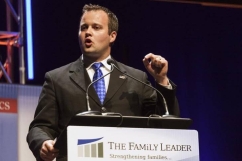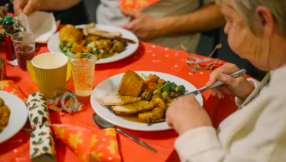As women, it can often feel as if 'our identity in Christ' is supposed to be our key focus, aided by the Christian publishing world, devotionals and women's conferences the world over. Resources and events for men rarely have such a focus – 'identity' is not generally regarded as an issue men struggle with – or one that is less important than issues like doctrine, leadership and family life. In recent decades, the church has identified self-esteem, confidence and feeling 'not good enough' as enormous issues for women, and they want to tackle them in a biblical way.
This is noble. Few people are in any doubt that modern society can be a toxic environment that leaves women anxious, depressed, struggling with body image issues and lacking in confidence. And it's not getting better. Who can blame the church for wanting to help, especially when desperately unhappy women seek advice or prayer?
In a world where women are constantly given the impression they don't measure up – sometimes even by the church with its frequent requests to be more, do more and give more – Christian culture has got it figured out that what women really want is to be loved and accepted. Seeing 'who you really are in Christ' is key to helping women overcome issues of self-esteem and self-doubt.
Unfortunately, it's sometimes difficult to square this with messages that don't get much further than reassuring women (yonger ones especially) that they're 'God's princess' or that He sees them as 'precious and beautiful'.
Part of my discomfort undoubtedly comes down to the negative associations of 'being a princess' that we often have these days. In fairy stories they existed to be rescued. It's all about behaving the right way, marrying the right man, rarely doing anything very interesting. Today, being a popular member of the royal family seems to mean having your every move watched as your outfits and body are scrutinised, your fertility made headline news and praise heaped on you the more conventionally you behave.
'Princess-themed' is now the default for toys aimed at very young girls. One friend said to me recently that "'Precious' used to mean 'close, revered, important'. Now it denotes delicacy and daintiness". And it's true. It doesn't always feel positive. People call a woman a 'princess' if she is selfish, high-maintenance and snobbish. It's hardly encouraging.
We know that historically, princesses haven't always led dull and restricted lives. Efforts to take the gender stereotypes out of childhood in recent years have led to books about princesses that climb trees and fight dragons. But the heavily stereotyped image of princesses largely remains. And here's where it gets tricky.
The idea of being 'God's precious princess' speaks to women in different ways. Some find it helpful, while others feel slightly queasy. In a Christian context, many would say that the word princess implies authority and importance as a daughter of a King and that this is their intention in using it. Personally, I've always been left with the feeling that while such platitudes might help us to feel a bit better, they don't necessarily equip us to understand more about ourselves and the world.
As a young woman, like many, I struggled enormously with self-esteem and body image. I was told on several occasions, by well-meaning people who really cared about wanting to help me, that in God's eyes, I was a beautiful princess. No-one ever said "It doesn't matter whether you're 'beautiful' or not". No-one told me that I didn't have to sit back and accept that the things that were making me feel that way existed. No-one told me fighting back was possible.
It's understandable that Christians seek to reassure women about the things that are affecting them the most. That all women want to feel beautiful, or that all women want to feel like a princess (whatever that may mean). And yet these things can simply reinforce the idea that being attractive is what's important – in no way opposing the messages we get from the rest of the world, and in no way taking the focus off looks as a key source of validation.

All women can benefit from being given tools to fight the toxic messages society has for us. Yes, we need to understand that we don't have to listen to them, but even better is going one step further and understanding, instead, that we can help get rid of them.
In the last five years, I've witnessed a shift as the language of feminism and 'empowerment' has found its way into Christian resources for women, focusing much more on using individual gifts to make a difference in the world, believing that you can do anything, and encouraging personal passions that don't always align with traditional femininity. This has happened on the back of a new acceptance in wider Christian culture that feminism is not necessarily a threat, and it has been an enormous breath of fresh air for countless women.
It has been encouraging to see the focus drawn away from simply giving women an impossible list of attributes to cultivate, a problem that most Christian women are aware of from experiences with devotionals and advice columns. They state that 'you're precious in God's eyes, but you need to work on all this other stuff in order to be the best Godly woman you can'. It does nothing for the debilitating sense of not being good enough that many women feel, even as it emphasises complete contentment in who we are.
I'm not always convinced about everyone jumping on the bandwagon of making noises about equality and empowerment simply to get in on a trend, but making the move from affirming beauty as important and doling out platitudes about princesses as healing ministry is a good thing. Rather than simply acknowledging the pressures society places on women, the church can work to speak out against them, breaking in to create change rather than assuming passive acceptance of 'the way things are' and handing out sticking plasters for open wounds.
Hannah Mudge writes about feminism and faith and is one of the founders of the Christian Feminist Network. She works in digital communications and fundraising for an international development organisation. Follow her on Twitter @boudledidge















